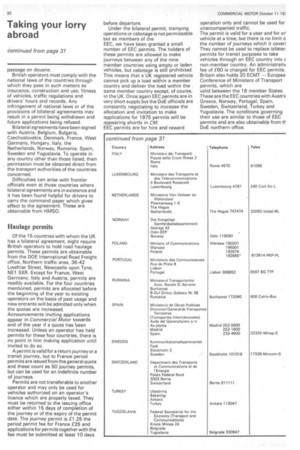Taking your lorry abroad
Page 34

If you've noticed an error in this article please click here to report it so we can fix it.
continued from page 31 passage en douane.
British operators must comply with the national laws of the countries through which they pass in such matters as insurance, construction and use, fitness of vehicles, traffic regulations and drivers' hours and records. Any infringement of national laws or of the provisions of bilateral agreements may result in a permit being withdrawn and future applications being refused.
Bilateral agreements have been signed with Austria, Belgium, Bulgaria, Czechoslovakia, Denmark, France, West Germany, Hungary, Italy, the Netherlands, Norway, Rumania, Spain, Sweden and Yugoslavia. To operate in any country other than those listed, then permission must be obtained direct from the transport authorities of the countries concerned.
Difficulties can arise with frontier officials even at those countries where bilateral agreements are in existence and it has been found helpful for drivers to carry the command paper which gives effect to the agreement. These are obtainable from HMSO.
Haulage permits
Of the 15 countries with whom the UK has a bilateral agreement, eight require British operators to hold road haulage permits. These permits are obtainable from the DOE International Road Freight office, Northern traffic area, 36-42 Lowfriar Street, Newcastle upon Tyne, NE1 5XR. Except for France, West Germany, Italy and Austria, permits are readily available. For the four countries mentioned, permits are allocated before the beginning of the year to existing operators on the basis of past usage and new entrants will be admitted only when the quotas are increased. Announcements inviting applications appear in Commercial Motor towards end of the year if a quota has been increased. Unless an operator has held permits for these four countries, there is no point in him making application until invited to do so.
A permit is valid for a return journey or a transit journey, but to France period permits are issued from the general quota and these count as 50 journey permits, but can be used for an indefinite number of journeys.
Permits are not transferable to another operator and may only be used for vehicles authorized on an operator's licence which are properly taxed. They must be returned to the issuing office either within 15 days of completion of the journey or of the expiry of the permit • date. The journey permit is E1.25 the period permit fee for France E25 and applications for permits together with the fee must be submitted at least 10 days before departure.
Under the bilateral permit, tramping operations or cabotage is not permissable but as members of the EEC, we have been granted a small number of EEC permits. The holders of these permits are allowed to make journeys between any of the nine member countries using empty or laden vehicles, but cabotage is still prohibited. This means that a UK registered vehicle cannot pick up a load within a member country and deliver the load within the same member country except, of course, in the UK. Once again EEC permits are in very short supply but the DoE officials are constantly negotiating to increase the allocation and invitation to make applications for 1975 permits will be appearing shortly in CM.
EEC permits are for hire and reward operation only and cannot be used for unaccompanied traffic.
The permit is valid for a year and for on vehicle at a time, but there is no limit o the number of journeys which it cover! They cannot be used to replace bilaten permits for transit purposes to take vehicles through an EEC country into E non-member country. An administrativ fee of £60 is charged for EEC permits. Britain also holds 20 ECMT — Europea Conference of Ministers of Transport permits, which are
valid between the 18 member States. These are the EEC countries with Austrii Greece, Norway, Portugal, Spain, Sweden, Switzerland, Turkey and Yugoslavia. The conditions governing their use are similar to those of EEC permits and are also obtainable from DoE northern office.




























































































































































